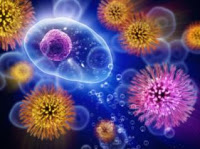Genital herpes is a skin disease caused mainly by the herpes simplex virus type 2 (HSV 2). In this article, we will get acquainted with the symptoms of infection and its treatment.
Genital herpes can be both female and male. How does infection occur, what are the signs, care and prevention? Genital herpes is usually transmitted through unprotected intercourse with infected people. The use of condoms reduces the risk of transmission of the pathogen, although it does not prevent a possible infection, as it can be «acquired» also:
- through affection;
- with incomplete sexual intercourse (oral sex), especially with people who have cold sores on their lips (HSV-1);
- in the exchange of erotic stimulants;
- when using towels, cutlery, glasses of infected people.
The greatest risk of contracting genital herpes is: babies (infection at birth, when passing through the birth canal of a sick mother), pregnant women and menopausal women (due to hormonal changes).
Symptoms of genital herpes
Most people with herpes do not feel any discomfort at the time of the initial stage of infection and do not even suspect that they can infect a person who comes into close contact with them. However, symptoms of the disease may appear 4-7 days after infection. Around the genitals, rectum, on the hips, buttocks, red blisters can form, which are converted into deep painful ulcers. Symptoms of the disease can also serve:
- fever;
- problems with urination;
- inguinal lymphadenitis;
- exhaustion.
These symptoms may last another 20 days. After the lesion, the sores heal on their own without leaving any scars. The herpes virus is able to remain dormant in some nerve cells in our body. And in this stage can remain until the end of life. Unfortunately, the virus activates from time to time and causes relapses of the infection.
Relapsing herpes manifests itself in the form of:
- itching in the genital area
- sudden rash;
- painful blisters on the foreskin (genital herpes in men).
- labia (in women)
Recurrent inflammations are usually shorter (up to 10 days) compared to the primary infection, because our body has now developed protective antibodies to cope with the virus.
Diagnosis of genital herpes
Herpes virus (HVS2) is easier to diagnose if the patient immediately consult a doctor at the first sign of infection. Typically, the presence of the virus in the human body can be seen from a blood test, discharge from vesicles that were formed in the skin, or analysis of seminal fluid.
How to treat genital herpes?
Medicines used to treat genital herpes: acyclovir and valaciclovir. You should strengthen your immune system by including carrots, cabbage, wheat germ, lemon, apples, grapes, and garlic in your diet.
















